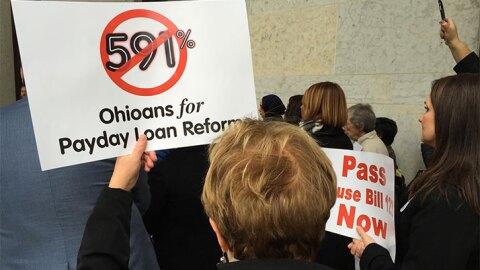The Ohio House has overwhelmingly passed long-awaited payday loan legislation meant to close loopholes those lenders use to charge high interest rates.
Thursday’s vote comes just after the House’s election of a new speaker, and while a reported FBI probe continues to investigate activities involving the former speaker and payday lending lobbyists.
Republican state Rep. Kyle Koehler says passage of HB 123 will help many Ohioans who tell him the interest they pay on their payday loans is so high that they can’t afford basic things like groceries.
“Another customer I met told me that she has paid $200 for four years out of her Social Security check for a $1,200 loan,” Koehler says.
Koehler notes that comes to a total of $9,600 – eight times the original loan amount.
But fellow Republican state Rep. Bill Seitz says people who use those loans want him to vote against the bill, which the industry says could shut down payday lending stores. He says it’s like borrowing $10 today and paying $11 back tomorrow.
Seitz used a reference from the 1970’s sitcom Sanford and Son to make his point.
“The APR on that one-day loan is 3,650 percent,” Koehler says. “Oh my God. Elizabeth, I’m coming to join you. 3,650 percent? Oh my God. But actually, most of us would think that’s quite reasonable.”
Seitz says the better thing to do would be to allow banks and credit unions to charge higher interest so they could afford to get into the short term loan business.
But in the end, most lawmakers sided with Koehler. The bill passed the House 71-17, and now goes to the Ohio Senate.
The bill came out of committee just after former Speaker Cliff Rosenberger resigned, reportedly related to an FBI inquiry into his travel with payday lending lobbyists. In committee, lawmakers rejected amendments that advocates worried would water down the reforms.
Whether or not the Ohio Senate gives a stamp of approval to the current bill, payday lending reform advocates are working to bring the issue directly to voters. Last month, the Ohio Ballot Board cleared the way for backers to begin collecting signatures on a constitutional amendment that would institute regulations similar to those in HB 123.





